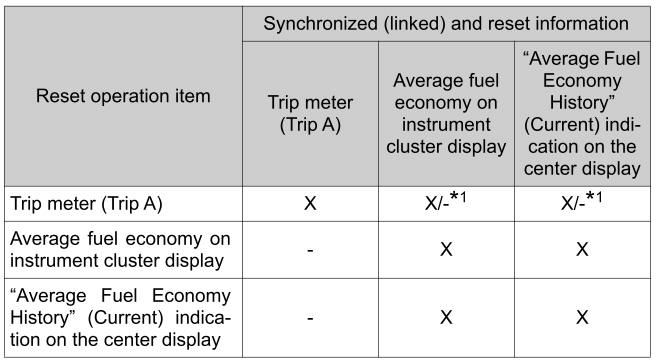Toyota Yaris: Fuel Economy Monitor (If equipped) / Fuel Economy Data Reset and Trip Meter (TRIP A) Synchronization (Linking)
Toyota Yaris XP210 (2020-2026) Owner's Manual / When Driving / Fuel Economy Monitor (If equipped) / Fuel Economy Data Reset and Trip Meter (TRIP A) Synchronization (Linking)
Because the average fuel economy indication on the instrument cluster display is linked with the “Average Fuel Economy History” (Current) indication on the center display, when one is reset the other is also reset.
In addition, switching between reset and no reset of the average fuel economy indication on the instrument cluster display and the “Average Fuel Economy History” (Current) indication on the center display when resetting the trip meter (Trip A) is possible.

X : Reset
- : Not reset
* 1 : Can be personalized. Refer to Customizable Features.
 Fuel Consumption Display
Fuel Consumption Display
Information regarding the fuel economy is displayed.
Displays the fuel economy for the past 60
minutes.
Displays the fuel economy every minute for
the past 1 to 10 minutes...
 Drive Selection
Drive Selection
Drive Selection (Automatic Transaxle)
Drive selection is a system to switch the vehicle’s drive mode.
When the sport mode is selected, vehicle’s response against
accelerator operation is enhanced...
Other information:
Toyota Yaris XP210 (2020-2026) Reapir and Service Manual: Reassembly
REASSEMBLY PROCEDURE 1. INSTALL HOOD BUMPER CUSHION (a) Rotate clockwise to install the 2 hood bumper cushions. 2. INSTALL HOOD SUPPORT ASSEMBLY (a) Engage the claws to install the hood support assembly. 3. INSTALL HOOD STAY HOLDER (a) Engage the claws to install the hood stay holder...
Toyota Yaris XP210 (2020-2026) Reapir and Service Manual: Invalid Data Received from Brake System Control Module Invalid Serial Data Received (U041881)
DESCRIPTION The millimeter wave radar sensor assembly receives signals related to the brake control condition from the skid control ECU (brake actuator assembly) via the CAN communication line. If the millimeter wave radar sensor assembly receives signals from the skid control ECU (brake actuator assembly) indicating a brake control system malfunction, the millimeter wave radar sensor assembly stores DTC U041881...
Categories
- Manuals Home
- Toyota Yaris Owners Manual
- Toyota Yaris Service Manual
- Adjustment
- To Set Speed
- Auto Lock/Unlock Function
- New on site
- Most important about car
Break-In Period
No special break-in is necessary, but a few precautions in the first 600 miles (1,000 km) may add to the performance, economy, and life of the vehicle.
Do not race the engine. Do not maintain one constant speed, either slow or fast, for a long period of time. Do not drive constantly at full-throttle or high engine rpm for extended periods of time. Avoid unnecessary hard stops. Avoid full-throttle starts.
Copyright © 2026 www.toyaris4.com
